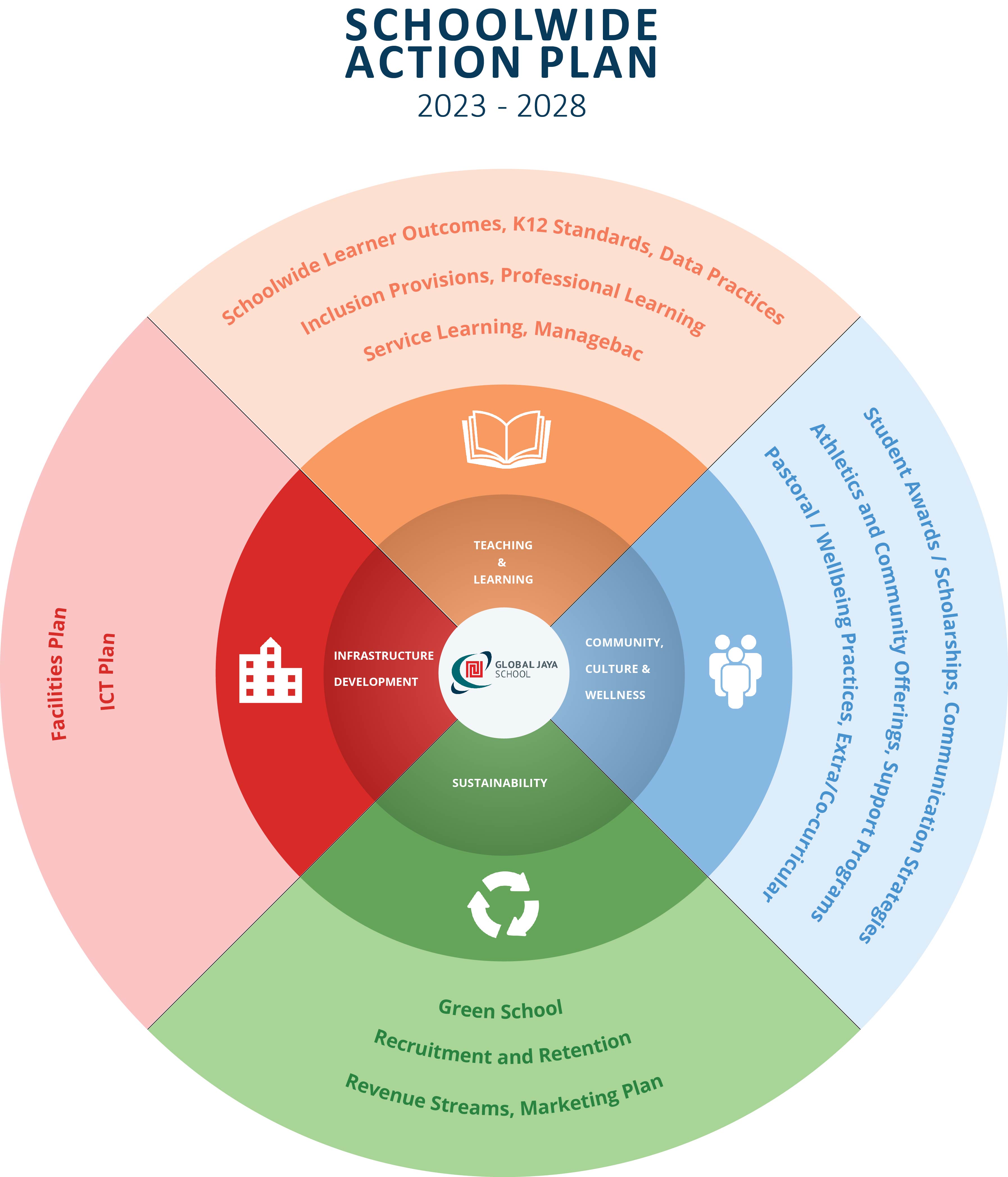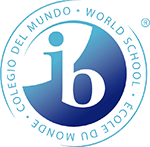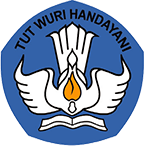Schoolwide Action Plan
We are pleased to share Global Jaya's Schoolwide Action Plan for 2023 - 2028 through this site.
In April 2023, GJS hosted a joint virtual visitation by representatives of the Western Association of Schools and Colleges (WASC) Accrediting Commission for Schools and representatives of the International Baccalaureate Organisation (IBO). This 5 year visitation was a follow-up to the April 2018 joint visit by the IBIO and WASC, and the December 2020 WASC mid-cycle visitation. Their combined efforts focused on monitoring and further supporting our initiatives and progress in delivering high-quality student learning and ongoing school improvement.
The WASC accreditation team affirmed that:
"It is clear that Global Jaya School has made significant progress in terms of its schoolwide action plan, as well as efforts to involve all school stakeholders in the process of school improvement, despite the Covid-19 pandemic. Throughout the self-study visit, the Visiting Committee was able to confirm many of the statements and findings of the school’s self-study and support the school in affirming that their findings were a genuine reflection of their self-study efforts and development."
Further, the IB authorisation team highlighted that:
"Global Jaya School demonstrates its long-standing commitment to the IB philosophy in the implementation of the three-programme continuum school and is committed to the ongoing sustainability and development of IB Programmes. The school contributes to developing a culture of respect for differences in its learners and encourages them to participate to grow as thinkers and inquirers and develop the disposition of being curious about the world. With the aim to support students for holistic development and lifelong learning, the school continues to innovate, reflect and evolve."
Global Jaya is a thriving IB World School with an abundance of potential. GJS offers the IB Continuum of Primary Years, Middle Years and Diploma Programmes. We are supported by the IB philosophy and Learner Profile and driven by GJS' own Vision and Mission statements. All leadership members are grateful to the community for its tremendous support, valuable time and effort, and welcome your involvement as we forge ahead to the next stage of Global Jaya's improvement process.
In April 2023, GJS hosted a joint virtual visitation by representatives of the Western Association of Schools and Colleges (WASC) Accrediting Commission for Schools and representatives of the International Baccalaureate Organisation (IBO). This 5 year visitation was a follow-up to the April 2018 joint visit by the IBIO and WASC, and the December 2020 WASC mid-cycle visitation. Their combined efforts focused on monitoring and further supporting our initiatives and progress in delivering high-quality student learning and ongoing school improvement.
The WASC accreditation team affirmed that:
"It is clear that Global Jaya School has made significant progress in terms of its schoolwide action plan, as well as efforts to involve all school stakeholders in the process of school improvement, despite the Covid-19 pandemic. Throughout the self-study visit, the Visiting Committee was able to confirm many of the statements and findings of the school’s self-study and support the school in affirming that their findings were a genuine reflection of their self-study efforts and development."
Further, the IB authorisation team highlighted that:
"Global Jaya School demonstrates its long-standing commitment to the IB philosophy in the implementation of the three-programme continuum school and is committed to the ongoing sustainability and development of IB Programmes. The school contributes to developing a culture of respect for differences in its learners and encourages them to participate to grow as thinkers and inquirers and develop the disposition of being curious about the world. With the aim to support students for holistic development and lifelong learning, the school continues to innovate, reflect and evolve."
Global Jaya is a thriving IB World School with an abundance of potential. GJS offers the IB Continuum of Primary Years, Middle Years and Diploma Programmes. We are supported by the IB philosophy and Learner Profile and driven by GJS' own Vision and Mission statements. All leadership members are grateful to the community for its tremendous support, valuable time and effort, and welcome your involvement as we forge ahead to the next stage of Global Jaya's improvement process.

The Global Jaya School (GJS) culture and environment is open, respectful and inclusive. This is evidenced in section D where the school culture is described as having the following features; “Open Door” policy between leadership, teachers, support staff, parents and students; respectful in relation to religious tolerance and inclusive in accepting a variety of nationalities within the school community.
WASC & IB 2023
Synchronous Visitation Feedback
WASC 2023 Schoolwide Areas of Strength:
- A strong community feel with a predominately friendly and respectful student population who benefit from a caring, supportive, and aware faculty in a comfortable and physically and emotionally safe learning environment.
- A collaborative, broad-based approach to whole school improvement which actively involves and considers a variety of perspectives from school community stakeholders.
- Implementation of the IB philosophy of international mindedness with a global mindset while preserving local context across programmes.
- Comprehensive school policies are developed and distributed to our school community with persons of responsibility identified; platforms and reporting methods are clearly identified.
- Comprehensive and clear child protection & safeguarding policies & processes which are effectively communicated and understood schoolwide.
- Bilateral communication which leads to increased vertical & horizontal integration schoolwide.
- Strong and effective support systems for student personal, academic and socio-emotional success.
- Personalized approaches through Universal Design for Learning (UDL) implementation.
WASC 2023 Schoolwide Areas for Further Development:
The visiting committee concurs with the school’s identified areas that are outlined in the ACS WASC International Visiting Committee Report schoolwide action plan. These are summarised below:
- Continue to expand inclusive school practices through the development of an enhancement programme.
- Enhance communication while further developing avenues of collaboration with the members of our school community.
- Further embedding of inclusive practices such as Universal Design for Learning and Social Emotional Learning.
- Continued socialisation of the safeguarding and child protection, behaviour and peer-to-peer abuse policies amongst different stakeholders, accounting for the language barrier and their level of engagement.
- Post-COVID-19 emphasis on resuming community-building activities and events that enhance and celebrate the diversity within the school community.
- Consider how professional learning can support innovative pedagogical practice.
In addition, the visiting committee, in conjunction with the IB visiting committee in the WASC/IB synchronised visit, has identified additional areas that need to be strengthened:
- Development of SLOs to be more concretely embedded into teaching and learning, and effectiveness measured accordingly.
- Enhance communication and active involvement of voices from all stakeholders.
- Monitoring and evaluation of school programs and systems to measure and analyse the effectiveness of student learning.
- Strengthen data-driven and evidence-based practices for informed decision-making to improve school systems.
- Innovative, technological and transformative approaches to teaching and learning aligned with inquiry-based approaches.
IB 2023 Programme Requirements:
- Based on the review of the programme documentation, observations of the team during the visit and in conversations with members of the school community, all PYP, MYP and DP programme requirements are in place.
IB 2023 Programme Strengths:
- The concepts of community, diversity, inclusion and compassion permeate and frame the work of all members in the school community.
- The governing body, leadership team and staff are actively engaged in the development and review of the school's mission and implementation of the programmmes.
- The school has implemented effective systems that monitor its students' and teachers' social, emotional and physical well-being.
- Teachers and pedagogical leaders engage in networking to share their views and knowledge, pose questions and discuss programme developments.
- Professional development (PD) planning is strategic, differentiated and ongoing to ensure teachers have access to, and use current and relevant documentation and programme resources.
- The roles and responsibilities of different stakeholders in the school community are clearly defined and articulated in the school policies, supporting a culture in which IB philosophy can thrive.
- School policies and procedures are published and communicated to all members of the school community through the school's website and its social media platforms, supported by the school's Parent Teacher Association (PTA), to ensure the policies are well understood by the community.
- Teachers understand and can discuss the academic integrity policy, its related practices and what they look like in each programme, and support parents' understanding through workshops in Indonesian.
- Students' active participation in school life and school community reflects the strong emphasis that the school has on developing a culture that fosters healthy relationships, shared responsibility and a sense of community that is unique to the context of the school.
- The school community embraces learner diversity by reflecting on and improving their current practices in creating an inclusive environment through the implementation of a tiered support system, the creation of a Dean of Student role in secondary and primary departments and teacher support, to enable every student to pursue and achieve their personal learning goals.
IB 2023 Opportunities for future or further programme development:
The school identified the following areas as priorities for programme development:
- Continuum: With an alignment of Data collection and a shared understanding of data, not only can we expect to see the usage of this within each programme but also strengthen our transition phases. Whilst an improvement in grades would be nice, ultimately, data-driven practices should further help us identify those students who most need support and ensure that all our students' needs are met.
- MYP: Looking at the results from CAT4 diagnostic comparison with the student's semester/yearly results. Also, the usage of iReady language data and how it impacts student learning in all subjects
- DP: The common understanding of the May exam results and using these results to improve the teaching and learning practices in the programme
- PYP: Greater focus on the vertical alignment in five subject areas (English, Indonesian, Mathematics, Social-studies and Science).
The Evaluation team has identified the following areas of the programme(s) for the school to consider for future or further development:
- The school is encouraged to facilitate conversations with students, teachers, parents and leadership team members, in the design and use of current learning spaces, as well as the use of technology, to further support the development of approaches to learning, to reflect students' interests and to respond to their changing needs.
- The school is encouraged to further explore closer alignment between UDL and ATL skills, to help provide students with coherent learning experiences as they transition across three programmes.
- The school may wish to consider unpacking the school policies with the various members of the school community so that they are partners in the creation and implementation of these policies.
- The school is encouraged to review the effectiveness of the collaborative planning meeting times and the planning process involved, to further support the development of transdisciplinary nature of the PYP, more engaging units that are interdisciplinary in the MYP and horizontal articulation between subjects in the DP, to enhance students' learning across programmes.
- The school may consider further engaging students in exploring, creating and co-constructing their conceptual understanding through inquiry learning and effective reflection, so that they can build their sense of agency in pursuing their personal interests and inquiry, particularly in the PYP and MYP.
- The school has implemented a four-tier pastoral framework within the student support provision, that emerged from the review of its inclusion policy, to reflect the school's commitment to removing barriers to learning for all. To further support this practice the school may consider the use of the principles of Universal Design Learning (UDL) across programmes and organize workshops and training for teachers in this area.
- The school may consider assessment dialogues within the school community to provide an optimised environment to adapt readily to varied and purposeful assessment methods.
- In the MYP, the school has developed a calendar of deadlines that is accessible to all the stakeholders on the school management system, Managebac. Students would benefit from being included in and having a voice in the scheduling of assessments to ensure that they are both seamless and paced in a manner that is manageable.




